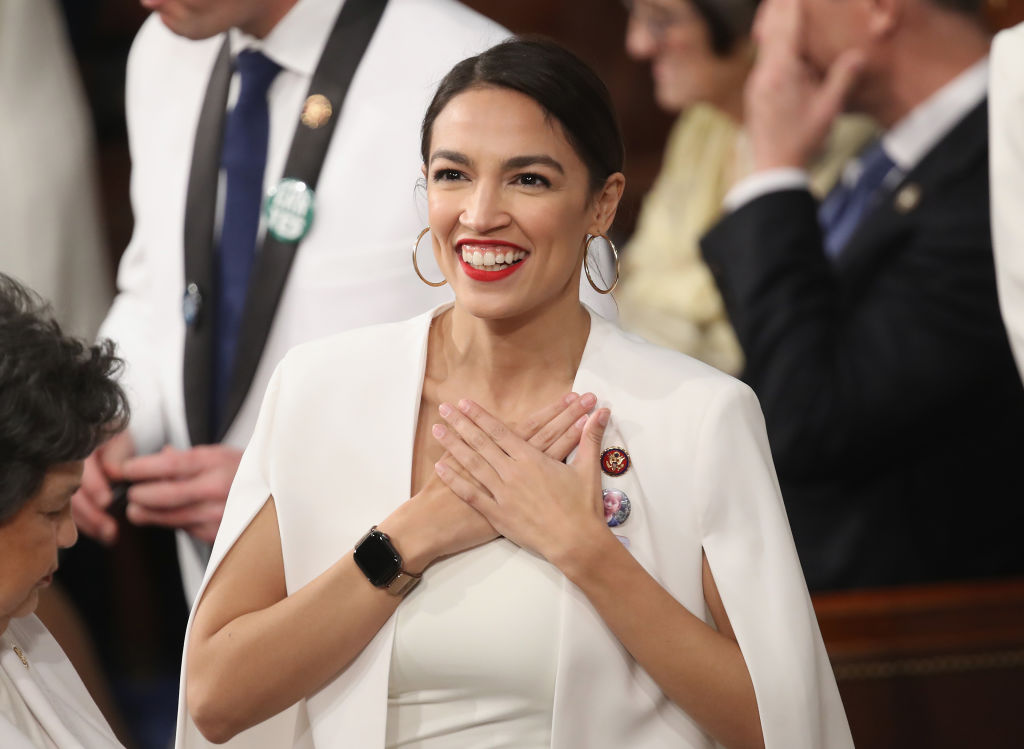Alexandria Ocasio-Cortez wants to pay for her Green New Deal by essentially printing more money


A free daily email with the biggest news stories of the day – and the best features from TheWeek.com
You are now subscribed
Your newsletter sign-up was successful
Rep. Alexandria Ocasio-Cortez (D-N.Y.) is back with another head-turning economic theory.
The freshman congresswoman debuted her Green New Deal bill on Thursday, which aims to overhaul the U.S. economy and eliminate carbon emissions. Despite a slew of Democratic backers, NPR says the bill is unlikely to pass — especially with Ocasio-Cortez's current far-left proposal to pay for it all.
Ocasio-Cortez's proposed 70 percent income tax on the mega-wealthy ended up being more popular than politicians and billionaires thought. But in a Thursday NPR interview, Ocasio-Cortez also declared we also have to "break the mistaken idea that taxes pay for 100 percent of government expenditure." She argued for a "combination of" taxes and deficit spending, essentially saying it's worth increasing the deficit if an idea might "actually pay for itself" through job creation later on, and that lawmakers could regulate inflation with strategic taxes down the line.
The Week
Escape your echo chamber. Get the facts behind the news, plus analysis from multiple perspectives.

Sign up for The Week's Free Newsletters
From our morning news briefing to a weekly Good News Newsletter, get the best of The Week delivered directly to your inbox.
From our morning news briefing to a weekly Good News Newsletter, get the best of The Week delivered directly to your inbox.
Essentially, Ocasio-Cortez is continuing to argue for Modern Monetary Theory — something she said "absolutely" needs to be "a larger part of our conversation" in a recent Business Insider interview. The theory says that because governments can literally print money, "they can spend as much as they like," Politico explains. "Inflation is the only obstacle" that should stop the presses, The Week details here. In short, it's a big, untested idea for a big, untested plan.
Read more two columnist's opinions on why the theory would and wouldn't work here at The Week.
A free daily email with the biggest news stories of the day – and the best features from TheWeek.com
Kathryn is a graduate of Syracuse University, with degrees in magazine journalism and information technology, along with hours to earn another degree after working at SU's independent paper The Daily Orange. She's currently recovering from a horse addiction while living in New York City, and likes to share her extremely dry sense of humor on Twitter.
-
 Local elections 2026: where are they and who is expected to win?
Local elections 2026: where are they and who is expected to win?The Explainer Labour is braced for heavy losses and U-turn on postponing some council elections hasn’t helped the party’s prospects
-
 6 of the world’s most accessible destinations
6 of the world’s most accessible destinationsThe Week Recommends Experience all of Berlin, Singapore and Sydney
-
 How the FCC’s ‘equal time’ rule works
How the FCC’s ‘equal time’ rule worksIn the Spotlight The law is at the heart of the Colbert-CBS conflict
-
 TikTok secures deal to remain in US
TikTok secures deal to remain in USSpeed Read ByteDance will form a US version of the popular video-sharing platform
-
 Unemployment rate ticks up amid fall job losses
Unemployment rate ticks up amid fall job lossesSpeed Read Data released by the Commerce Department indicates ‘one of the weakest American labor markets in years’
-
 US mints final penny after 232-year run
US mints final penny after 232-year runSpeed Read Production of the one-cent coin has ended
-
 Warner Bros. explores sale amid Paramount bids
Warner Bros. explores sale amid Paramount bidsSpeed Read The media giant, home to HBO and DC Studios, has received interest from multiple buying parties
-
 Gold tops $4K per ounce, signaling financial unease
Gold tops $4K per ounce, signaling financial uneaseSpeed Read Investors are worried about President Donald Trump’s trade war
-
 Electronic Arts to go private in record $55B deal
Electronic Arts to go private in record $55B dealspeed read The video game giant is behind ‘The Sims’ and ‘Madden NFL’
-
 New York court tosses Trump's $500M fraud fine
New York court tosses Trump's $500M fraud fineSpeed Read A divided appeals court threw out a hefty penalty against President Trump for fraudulently inflating his wealth
-
 Trump said to seek government stake in Intel
Trump said to seek government stake in IntelSpeed Read The president and Intel CEO Lip-Bu Tan reportedly discussed the proposal at a recent meeting
